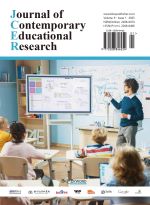Abstract
Assessment is a crucial aspect of the teaching process for teachers. Teachers’ assessment literacy is closely related to students’ learning outcomes. The language assessment literacy of foreign language teachers is a significant component of both teachers’ professional development and students’ learning, and it has become a research hotspot in the field of domestic language testing. Based on clarifying the theoretical framework of language assessment literacy, this paper proposes the main cultivation paths for pre-service English teachers’ language assessment literacy, aiming to provide inspiration and references for the cultivation, reform, and development of teachers in basic foreign language education.
References
Stiggins RJ, 1991, Assessment Literacy. The Phi Delta Kappan, 72(7): 534–539.
Baird JA, 2013, The Currency of Assessments. Assessment in Education: Principles, Policy and Practice, 20(2): 147–149.
Schafer WD, Lissitz RW, 1987, Measurement Training for School Personnel: Recommendations and Reality. Journal of Teacher Education, 38(3): 57–63.
Jin Y, 2010, The Place of Language Testing and Assessment in the Professional Preparation of Foreign Language Teachers in China. Language Testing, 27(4): 555–584.
Boyles P, 2005, Assessment Literacy, in Rosenbusch M, National Assessment Summit Papers, Iowa State University, Ames, IA, 11–15.
Wu Y, 2016, Research on Foreign Language Teachers’ Assessment Literacy. Shanghai Education Research, (12): 76–79.
Taylor L, 2009, Developing Assessment Literacy. Annual Review of Applied Linguistics, 29: 21–36.
Peng K, 2014, Research on Foreign Language Teachers’ Foreign Language Testing Literacy and its Enlightenment to Foreign Language Teacher Education in China. Foreign Language Testing and Teaching, (4): 21–26.
Zheng D, 2014, Research on the Development of Teachers’ Evaluation Literacy, dissertation, Zhejiang University Press.
Gee J, 2004, Situated Language and Learning: A Critique of Traditional Schooling, Routledge, New York.
Willis J, Adie L, Klenowski V, 2013, Conceptualizing Teachers’ Assessment Literacies in an Era of Curriculum and Assessment Reform. The Australian Educational Researcher, 40(2): 241–256.
Looney A, Cumming J, Van Der Kleij F, et al., 2017, Reconceptualising the Role of Teachers as Assessors: Teacher Assessment Identity. Assessment in Education: Principles, Policy & Practice, 25(5): 442–467.
Gao X, Sheng Y, 2023, Language Teachers’ Evaluation Literacy: Connotation, Framework, and Prospects. Foreign Language Research, 2023(6): 44–57.
Jiang J, 2019, Research on the Current Situation and Influencing Factors of College English Teachers’ Assessment Literacy. Foreign Language World, (6): 18–26.
Zheng D, 2022, What Kind of Assessment Literacy Do Teachers Need in the New Era. Research on Educational Development, (4): 46–51.
Wang S, 2009, Framework of Teachers’ Assessment Literacy in the Paradigm Shift of Educational Assessment. Teacher Education Research, (2): 65–69.
Brindley G, 2001, Language Assessment and Professional Development, in Elder C, et al., Experimenting with Uncertainty: Essays in Honour of Alan Davies, Cambridge University Press, Cambridge, 126–136.
Davies A, 2008, Textbook Trends in Teaching Language Testing. Language Testing, 25(3): 327–347.
Inbar-Lourie O, 2008, Constructing a Language Assessment Knowledge Base: A Focus on Language Assessment Courses. Language Testing, 25(3): 385–402.
Fulcher G, 2012, Assessment Literacy for the Language Classroom. Language Assessment Quarterly, 9(2): 113–132.
Jin Y, 2018, Development of Foreign Language Teachers’ Evaluation Literacy: Theoretical Framework and Path Exploration. Frontiers in Foreign Language Education Research, (2): 65–72, 93.
Lin D, 2019, Reference Framework for Language Evaluation Literacy of Primary and Secondary School English Teachers, Foreign Language Teaching and Research Press, Beijing.
Li L, Wang Q, 2020, Foreign Language Teachers’ Classroom Evaluation Literacy: Concept Composition, Observation System, and Practical Enlightenment. Foreign Language Testing and Teaching, (2): 20–27.
Taylor L, 2013, Communicating the Theory, Practice, and Principles of Language Testing to Test Stakeholders: Some Reflections. Language Testing, 30(3): 403–412.
Giraldo F, 2018, Language Assessment Literacy: Implications for Language Teachers. Profile Issues in Teachers’ Professional Development, 20(1): 179–195.
Gan L, Jiang C, 2020, A Review of Foreign Research on Teachers’ Assessment Literacy. China Examinations, (1): 72–78.
Wu Z, 2021, Diagnostic Language Assessment and Teacher Decision-Making and English Teacher Evaluation Literacy—Taking the Basic Education Stage as an Example. Foreign Language Testing and Teaching, (4): 1–8, 21.
Inbar-Lourie O, 2013, Guest Editorial to the Special Issue on Language Assessment Literacy. Language Testing, 30(3): 301–307.
